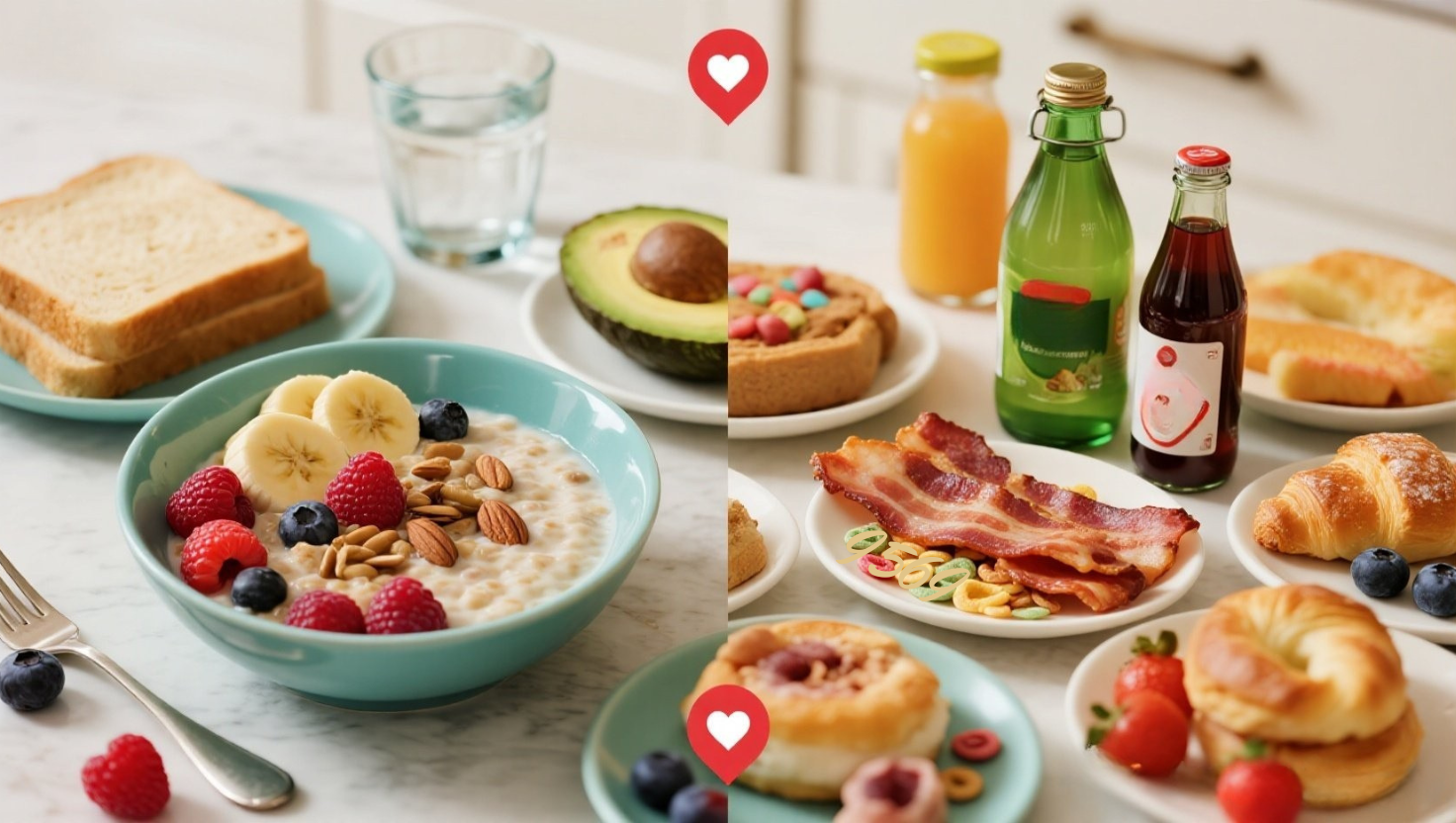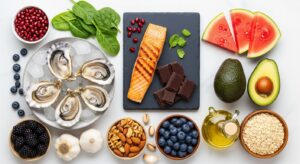5 Breakfast Mistakes That Are Silently Damaging Your Health
We’ve all heard it a thousand times: “Breakfast is the most important meal of the day.” But what if I told you that most of us are getting it completely wrong?
After diving deep into the latest cardiovascular research and speaking with nutrition experts, I’ve uncovered some eye-opening truths about our morning eating habits. The breakfast choices you’re making right now might be quietly sabotaging your heart health, blood sugar levels, and overall wellbeing – and you probably don’t even realize it.
Let’s talk about the five breakfast mistakes that could be doing more harm than good, backed by solid science and real-world solutions you can implement tomorrow morning.
1. Loading Up on Hidden Salt (The Silent Heart Killer)
Here’s something that shocked me when I first learned it: 70% of the salt we eat daily comes from packaged and processed foods, according to the FDA. That innocent-looking breakfast sandwich or those convenient frozen waffles? They’re salt bombs in disguise.
The American Heart Association recommends no more than 1,500 mg of sodium daily for optimal heart health, but most Americans consume over 3,300 mg. That’s more than double the safe limit, and breakfast foods are major contributors.
A groundbreaking study published in Nutrients found that people following high-sodium diets had a 19% higher risk of developing cardiovascular disease compared to those who kept their sodium intake in check. The reason? Excess sodium disrupts your body’s renin-angiotensin system, which regulates blood pressure and fluid balance. This forces your heart to work overtime pumping blood, gradually leading to serious cardiovascular problems.
What to do instead: Start reading nutrition labels religiously. Look for breakfast options with less than 400 mg of sodium per serving. Swap that processed breakfast meat for fresh turkey or lean ham, and choose whole grain cereals without added salt.
2. The Saturated Fat Trap (Your Arteries’ Worst Enemy)
Many of us reach for bacon, sausage, or buttery pastries for breakfast without thinking twice. But here’s where it gets scary: research published in Circulation (the American Heart Association’s premier journal) revealed that consuming just 140 grams of processed meat per week increases your risk of serious cardiovascular events by 46%.
Saturated fats from processed breakfast meats don’t just add calories – they actively build up plaque in your arteries, leading to atherosclerosis. Even worse, many processed meats contain nitrates and nitrites as preservatives, which can convert into N-nitroso compounds in your body. These compounds are classified as potential carcinogens.
The science-backed solution: Replace processed meats with plant-based proteins like nut butters, Greek yogurt, or eggs from pasture-raised chickens. If you can’t give up bacon entirely, limit it to once a week and pair it with fiber-rich foods to help mitigate some of the damage.
3. Sugar Crashes That Destroy Your Metabolism
Those Instagram-worthy donuts and sugary cereals might look appetizing, but they’re metabolic chaos in a bowl. When you start your day with added sugars, you’re setting yourself up for a blood sugar rollercoaster that can lead to type 2 diabetes over time.
Research consistently shows that high sugar intake, especially in the morning, is linked to increased risks of stroke, heart failure, and atrial fibrillation. The problem isn’t just the immediate blood sugar spike – it’s the crash that follows, leaving you hungry, irritable, and craving more sugar within hours.
The fix: Choose naturally sweet options like fresh berries with oatmeal or a small amount of raw honey drizzled over Greek yogurt. These provide sweetness along with fiber and nutrients that help stabilize your blood sugar.
4. The Fiber Deficit (Missing the Most Important Nutrient)
Here’s a statistic that’ll make you rethink your breakfast choices: Harvard Health Publishing reports that most Americans only get about 16 grams of fiber daily, when we actually need 28 grams for optimal heart health and diabetes prevention.
Many popular breakfast foods – white bread, sugary cereals, processed pastries – contain virtually no fiber. This isn’t just a digestion issue; it’s a cardiovascular problem. Fiber helps control cholesterol levels and blood sugar, and without it, you’ll feel hungry much sooner, leading to unhealthy snacking throughout the day.
The game-changer: Aim for at least 5 grams of fiber at breakfast. Oatmeal with fresh fruit, whole grain toast with avocado, or a smoothie with spinach and berries can easily hit this target. Your heart and waistline will thank you.
5. Skipping Breakfast Entirely (The 87% Risk Increase)
Maybe you’re thinking, “I’ll just avoid all these problems by skipping breakfast altogether.” Hold on – this might be the worst mistake of all.
A large-scale study found that people who regularly skip breakfast have an 87% higher risk of dying from cardiovascular disease compared to those who eat breakfast consistently. Skipping breakfast doesn’t just disrupt your biological rhythms; it increases insulin resistance, raises blood pressure, and is associated with a 75% higher risk of atherosclerosis.
The research also links breakfast skipping to obesity, increased LDL (bad) cholesterol, and even mental health issues like depression. Your body needs that morning fuel to function optimally.
The solution: If time is your enemy, prepare grab-and-go options the night before. Overnight oats, hard-boiled eggs, or a protein smoothie can be ready in minutes.
What Does a Heart-Healthy Breakfast Actually Look Like?
Now that we’ve covered what not to do, let’s talk about building the perfect breakfast for your cardiovascular health:
Start with fiber: Aim for oatmeal, whole grain toast, or fresh fruit to get at least 5 grams of fiber.
Add quality protein: Include 20-30 grams of protein from sources like eggs, Greek yogurt, or nut butter to keep you satisfied and maintain steady energy levels.
Include healthy fats: A small amount of avocado, nuts, or seeds provides essential fatty acids that support heart health.
Mind your sodium: Keep it under 400 mg per meal by choosing fresh, minimally processed ingredients.
Natural sweetness only: Use fresh fruit or a small drizzle of honey instead of added sugars.
The Bottom Line
Your breakfast sets the tone for your entire day – not just energy-wise, but metabolically. The choices you make in those first few minutes after waking up can either support your long-term health or quietly undermine it.
The good news? Small changes can make a massive difference. You don’t need to overhaul your entire morning routine overnight. Start with one change – maybe swapping that processed breakfast sandwich for oatmeal with berries, or reading labels to choose lower-sodium options.
Remember, we’re not just talking about feeling better in the short term. These breakfast strategies are backed by peer-reviewed research showing real reductions in heart disease, diabetes, and stroke risk. That’s the kind of morning investment that pays dividends for decades.
What breakfast mistake surprised you the most? Your heart health journey starts with the very next meal you eat – why not make it count?














Post Comment